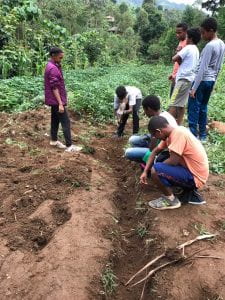Junior Rana Magzoub was born in Saudi Arabia, before making the move to Sudan, where she lived for 15 years. With Arabic being her first language, Magzoub had to adjust when she moved again to America in 2018 with her family, including her older sister — now at Virginia Tech — and her younger twin brothers. “My dad lives with us, but [he’s] in and out of the country. I miss him obviously, but at the same time, we can manage. My mom is great, she is always there,” Magzoub said.
However, Magzoub did leave one part of her family behind in Sudan, her close friends. She recalled memories of gathering at the local community center after school. “We would sit there and socialize, eat, play basketball sometimes. [Those] are my life-long friends. I’m pretty sure we are going to share the same death bed,” Magzoub laughed.
Magzoub made her lifelong friends due to her personality which she describes as,“Reserved, but I’m also a very fun person. It just takes a while for me to open up. So when I moved here, it was a huge culture shock and really hard for me to make friends.” Magzoub shared her struggles with understanding how American teenagers interact compared to her former friends, “I didn’t know what to say or what would be considered weird because there are different norms. Culture wise, language, religion, values, morals, just everything is so different. Especially the environment and sense of freedom.”
“[I try to] always be grateful and give back because I have traveled a lot and I feel like it’s shaped who I am and gives me a broader perspective in life,” Magzoub expressed. Magzoub doesn’t take that statement lightly as she has traveled to over 10 countries such as Switzerland, Malaysia and Egypt.
In 2016, Magzoub went to Uganda on a science based field trip to learn about ecology. A large part of her trip was to help the Batwa, one of the oldest surviving tribes in Uganda. The tribe was displaced and their land declared a national park, leaving them with no resources or means to live. Magzoub’s school collected money to buy chickens and materials to build a chicken coop to help the group generate a long term food source.
“I think it’s the biggest thing I’ve done to help people. Obviously I’ve donated my clothes and given them to charity, but I feel like this was something huge where I was there for it,” said Magzoub. “I always say I want to make a difference. Whether it’s one person or a whole community even though it kind of cheesy or like a cliche.”
“We moved here for more of an opportunity, especially education-wise. Our parents are very open and they really want us to have the highest and best education that they possibly can give us,” she said.
“I want to go into business and once I finish that I want to get my masters and then probably go back to Sudan and start a company that has different branches,” added Magzoub, “My main goal when I talk to my sister is similar. We want to get [our] education and some work experience and then go back to Sudan [to] apply everything we have learned such as improving street and prison conditions.”
